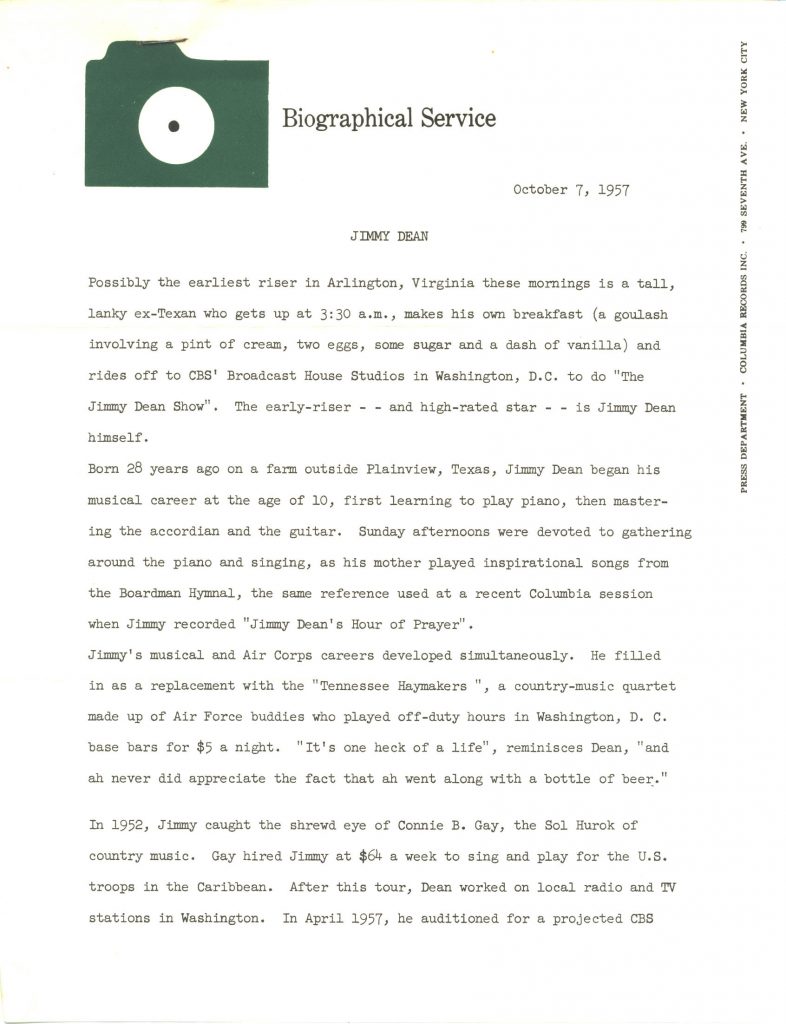 North Carolina lawyer, musician, and folklorist Bascom Lamar Lunsford, ca. 1960s. From the John Edwards Memorial Foundation Collection.
North Carolina lawyer, musician, and folklorist Bascom Lamar Lunsford, ca. 1960s. From the John Edwards Memorial Foundation Collection.
Jamie
Mr. Garfield and Charles Guiteau
 On June 30th, 1882, the assassin Charles Guiteau was hanged in Washington, DC, almost a year to the day after his fatal shooting of President James A. Garfield. In March of 1949, North Carolina musician and folk song collector Bascom Lamar Lunsford traveled to Washington to record for the Library of Congress, and the many songs he recorded there included two topical ballads concerning the assassination of Garfield and execution of Guiteau. The epic narrative of the assassination “Mr. Garfield”, recorded on March 23rd, would later be popularized by Johnny Cash (you can watch him perform it on The Johnny Cash Show here). Lunsford introduces it:
On June 30th, 1882, the assassin Charles Guiteau was hanged in Washington, DC, almost a year to the day after his fatal shooting of President James A. Garfield. In March of 1949, North Carolina musician and folk song collector Bascom Lamar Lunsford traveled to Washington to record for the Library of Congress, and the many songs he recorded there included two topical ballads concerning the assassination of Garfield and execution of Guiteau. The epic narrative of the assassination “Mr. Garfield”, recorded on March 23rd, would later be popularized by Johnny Cash (you can watch him perform it on The Johnny Cash Show here). Lunsford introduces it:
I first heard it about 1903 when I visited the home of Mr. A.W. Williams, who lived on the edge of Henderson County, North Carolina… Anderson Williams, a young man, picked it and played it on the banjo… Once after I heard one stanza by another person. That’s the only two people I ever heard sing the song, besides myself.”
Mr. Garfield clip
The very next day Lunsford recorded a ballad sung from the perspective of the condemned man:
This is another assassination song, known as “Charles Guiteau”. I’ve known this all my life.”
CharlesGuiteau
Clips from Emrich Duncan’s Songs and Ballads of American History and the Assassination of Presidents (SFC FC-545 and CD-906).
Photo of the Week: J.P. Fraley
 Kentucky fiddler J.P. Fraley, far right, with an unidentified accomplice. Ca. 1930s, from the Guthrie T. Meade Collection.
Kentucky fiddler J.P. Fraley, far right, with an unidentified accomplice. Ca. 1930s, from the Guthrie T. Meade Collection.
Iry LeJeune Recordings Added to National Recording Registry
 The Library of Congress has named two recordings by Cajun accordionist and singer Iry LeJeune to the National Recording Registry. “Evangeline Special” and “Love Bridge Waltz” were both recorded for Goldband Records in 1948 and the original master tapes are housed in the SFC’s Goldband Records Collection.
The Library of Congress has named two recordings by Cajun accordionist and singer Iry LeJeune to the National Recording Registry. “Evangeline Special” and “Love Bridge Waltz” were both recorded for Goldband Records in 1948 and the original master tapes are housed in the SFC’s Goldband Records Collection.
From the Library of Congress press release:
“The post-World War II revival of traditional Cajun music began with accordionist Iry LeJeune’s first single, his influential recordings of “Evangeline Special” and “Love Bridge Waltz.” Le Jeune’s emotional and deeply personal style was immensely popular with Louisiana Cajuns returning home from the war, eager to hear their own music again. His recordings marked a distinct move away from the style influenced by Western Swing that had dominated commercial Cajun recordings for over a decade and a return to the older sound of Cajun music. This sound featured the accordion, prominently and unrestrained, and a blues-influenced singing in French. LeJeune is regarded as one of the best Cajun accordionists and singers of all time.”
Listen below to clips of both songs:
Evangeline Special clip
Love Bridge Waltz clip
Clips from SFC CD-713, The Legendary Iry Lejeune.
Photo of the Week: Marshall Claiborne
 One-armed fiddler Marshall Claiborne of Hartsville, Tennessee, ca. 1926. Claiborne placed second in the 1926 old-time fiddlers’ contest at Nashville, utilizing an unusual technique of holding the bow between his knees and moving the fiddle against it with his left arm. Photo from the Guthrie T. Meade Collection.
One-armed fiddler Marshall Claiborne of Hartsville, Tennessee, ca. 1926. Claiborne placed second in the 1926 old-time fiddlers’ contest at Nashville, utilizing an unusual technique of holding the bow between his knees and moving the fiddle against it with his left arm. Photo from the Guthrie T. Meade Collection.
Jimmy Dean's Breakfast, ca. 1957
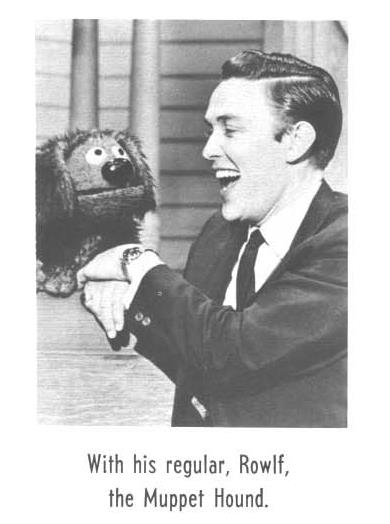 We were saddened to learn of the passing of Jimmy Dean, the country singer behind the 1961 hit “Big Bad John” and host of the long-running country music showcase The Jimmy Dean Show (he’s pictured here with the show’s frequent guest muppet, Rowlf).
We were saddened to learn of the passing of Jimmy Dean, the country singer behind the 1961 hit “Big Bad John” and host of the long-running country music showcase The Jimmy Dean Show (he’s pictured here with the show’s frequent guest muppet, Rowlf).
Jimmy Dean was perhaps best known to this generation as a sausage magnate, and it’s clear from this October 7, 1957 Columbia Records press bio that, even before he entered the sausage business, breakfast had always been a central element of his persona:
Possibly the earliest riser in Arlington, Virginia these mornings is a tall, lanky ex-Texan who gets up at 3:30 a.m, makes his own breakfast (a goulash involving a pint of cream, two eggs, some sugar and a dash of vanilla) and rides off to CBS’ Broadcast House Studios in Washington, D.C. to do “The Jimmy Dean Show”. The early riser — and high-rated star — is Jimmy Dean himself.”
(click to enlarge)
Press release from SFC’s Artist Name File Collection, picture of Dean with “Rowlf the Muppet Hound” from Thurston Moore’s 1965 book The Pictorial History of Country Music.
Photo of the Week: The Farr Brothers
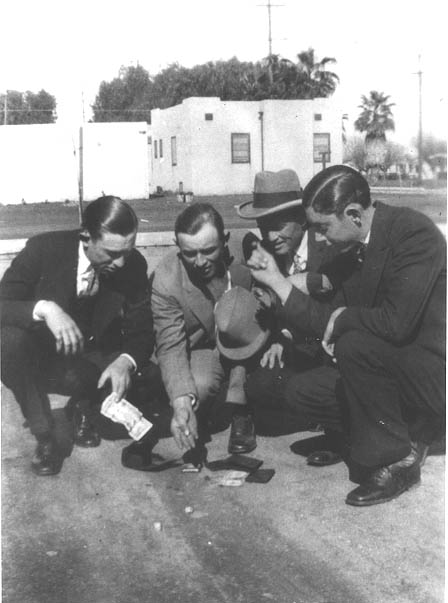 Texas-born brothers Hugh Farr, Glen Farr, and Karl Farr (along with their brother-in-law Billy Weir, wearing the hat), photographed in 1927 in Van Nuys, California. Hugh and Karl would later join Roy Rogers in the Sons of the Pioneers and record an obviously autobiographical fiddle tune called “The Texas Crapshooter”: Texas Crapshooter
Texas-born brothers Hugh Farr, Glen Farr, and Karl Farr (along with their brother-in-law Billy Weir, wearing the hat), photographed in 1927 in Van Nuys, California. Hugh and Karl would later join Roy Rogers in the Sons of the Pioneers and record an obviously autobiographical fiddle tune called “The Texas Crapshooter”: Texas Crapshooter
Clip from TR-873 in the Sons of the Pioneers Transcription Disc Collection.
Photo of the Week: Count Rockin' Sidney
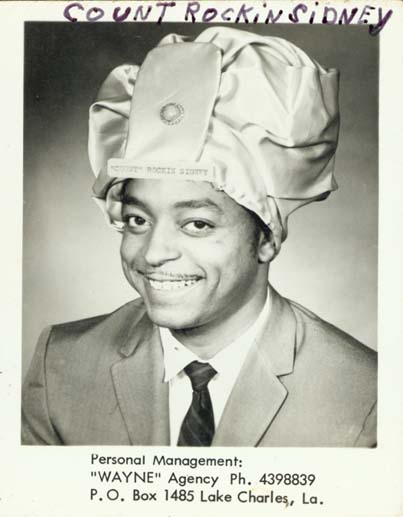 Louisiana R&B singer Count Rockin’ Sidney in a ca. 1965 promotional photo from the Goldband Records Collection.
Louisiana R&B singer Count Rockin’ Sidney in a ca. 1965 promotional photo from the Goldband Records Collection.
Jesse Rodgers, the Cousin of the Father of Country Music
When Jimmie Rodgers finally succumbed to tuberculosis on May 26, 1933, the world of country music was left without its founding father, and Victor records was left without one of its biggest stars. If an effort to fill the void, Victor quickly signed Jimmie’s cousin, Jesse Rodgers, to their Bluebird record label. Similarities between the two were emphasized, with rumors circulating that they had grown up in the same household (they hadn’t), and that Jimmie had taught Jesse to play the guitar (he probably didn’t). Sides were recorded with distinctly Jimmie Rodgers-esque titles (“Yodeling Railroad Blues”), and Jesse even signed his early promotional photographs with Jimmie’s trademark “Yodelingly Yours,”.
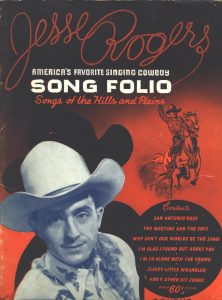
But as time wore on Jesse must have found the comparisons to Jimmie constricting, or perhaps waning commercial interest in Jimmie Rodgers imitators made them less desirable. He developed his own “singing cowboy” persona, and by 1938 had dropped the “d” from his last name in an effort to further distance himself from his cousin (and likely to associate himself with that other singing cowboy, Roy Rogers).
While he never came close to being the national star Jimmie was, the singing cowboy Jesse Rogers had a successful career as a featured performer on the WLS National Barn Dance in Chicago and on WFIL’s Hayloft Hoedown in Philadelphia (where he would go on to host the children’s television show Ranger Joe). His recording career continued into the early ’60s, when emphysema forced him to retire.
Listen below to clips from two of Jesse Rodgers’ 1934 Bluebird recordings, the heavily Jimmie Rodgers-influenced “San Antonio Blues”: SanAntonioBluesclip
And the cowboy song “Old Pinto, My Pony, My Pal”: OldPintoclip
(Both sound clips from SFC 78-828; 1946 Bourne Music Publishers song folio from the SFC Song Folios Collection.)
Photo of the Week: Stoneman Family
 Taken in Galax, Virginia, in 1928. From left to right: Iver Edwards, George Stoneman, Eck Dunford, Ernest Stoneman, Hattie Stoneman, and Balen Frost.
Taken in Galax, Virginia, in 1928. From left to right: Iver Edwards, George Stoneman, Eck Dunford, Ernest Stoneman, Hattie Stoneman, and Balen Frost.

